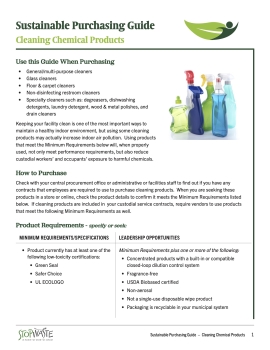Resource Library
 Topic Briefs
Topic Briefs
Although all “antimicrobial” products have risks, many conventional disinfectants, such as chlorine bleach, pose more serious risks to custodial workers and building occupants because they contain active ingredients that have been found to cause asthma, cancer, skin sensitization, or other health hazards. Yet, surface disinfectants with more benign health and environmental impacts than conventional disinfectants are readily available, cost effective, and have equivalent or greater efficacy in killing bacteria, viruses, and fungi.
Read More
Janitorial paper products are single-use items primarily used in facility restrooms and break rooms. They may be purchased as stand-alone items or included in a custodial services contract. Any janitorial paper products purchased directly by staff must contain a minimum of 30% post-consumer recycled content to comply with California’s Senate Bill 1383, aka SB 1383, which went into effect January 2022.
Read More
Keeping your facility clean is one of the most important ways to maintain a healthy indoor environment, but using some cleaning products may actually increase indoor air pollution. Using products that meet the Minimum Requirements below will, when properly used, not only meet performance requirements, but also reduce custodial workers’ and occupants’ exposure to harmful chemicals.
Read MoreNew State law, SB 1383, and the Alameda County Organics Reduction and Recycling Ordinance went into effect January 1, 2022, including requirements for certain food generating businesses to donate edible food to a local food recovery organization or service and establish contracts or written agreements with them. Organizations receiving surplus edible food from donors must maintain documen
Read More Topic BriefsRead More
Topic BriefsRead MoreThis awards program honors Alameda County businesses and institutions whose leadership and continuous efforts to improve environmental performance and business efficiency have achieved outstanding results. Since the inception of the awards program in 2000, well over 100 Alameda County businesses and institutions have been recognized.
 Policies
Policies